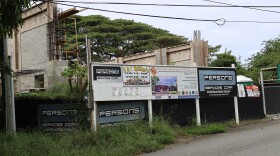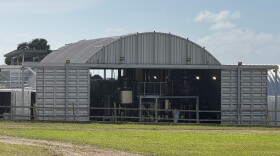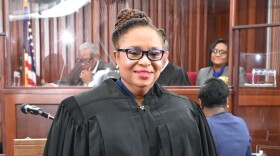ST. CROIX — The Virgin Islands Housing Authority’s board of commissioners acted to ensure the agency can make payroll by approving a $750,000 line of credit during a regular meeting Wednesday in addition to adopting a resolution that imposes a $100,000 asset limit for housing eligibility in line with federal law.
Additionally, the Housing Authority’s new executive director, Dwayne Alexander, who previously worked with the VIHA team as deputy executive director and chief of staff, expounded during a Senate meeting Wednesday on St. Thomas on the resolution the board adopted for the implementation of requirements set forth in the Housing Opportunity Through Modernization Act of 2016.
During the Committee on Housing, Transportation and Telecommunications meeting, senators expressed condolences after learning about the death on Tuesday of Robert Graham, who served as VIHA executive director for 15 years from 2008 until his retirement at the end of 2023.
The VIHA board approved a resolution for a $750,000 line of credit with FirstBank of Puerto Rico to give the agency enough funds for payroll until the U.S. Department of Housing and Urban Development approves the 2024 Capital Fund Program grant in June or July, according to Cecile Tonge-Fahie, VIHA chief financial officer.
“This funding source will give us enough funds for payroll to meet our daily needs until then, and of course by managing the funds wisely, that’s what’s required and that’s what we will do as an organization,” the CFO said during the meeting.
The VIHA board also imposed a $100,000 asset limit for housing eligibility by adopting a resolution to approve a new Admissions and Continued Occupancy Policy (ACOP) effective March 1, for changes retroactively to June 2023.
The changes relate to Section 103 of the Housing Opportunity Through Modernization Act of 2016, or HOTMA, and other changes initiated by VIHA, as well as for the implementation of the requirements of Sections 102 and 104 of HOTMA, effective October 1. VIHA added HOTMA and updated ACOP, making 48 changes.
HOTMA is the federal law that affects the income calculation, net family assets, and income review for multifamily housing programs. Alexander said the new ACOP modifies VIHA programs relating to income and assets.
HOTMA imposes a $100,000 asset limit for eligibility and continued assistance, according to HUD. Families are also ineligible for assistance if they own real property suitable for occupancy. Prior to this change, there was no limit on assets; instead, income from assets was calculated or imputed and included in tenant income.
Furthermore, HOTMA raises the imputed asset threshold to $50,000 from $5,000, incentivizing families to build wealth without imputing income on those assets.
Simba Abiff, VIHA board member, discussed an issue he has with HOTMA during the board meeting. He described a situation where someone enters public housing while earning a low income but begins earning a higher salary and no longer qualifies for public housing eligibility.
“Provide another alternative for me rather than telling me, ‘hey, you’re making this amount of money now, we need to make space for others, you need to get out,’” he said. “And that’s basically what it says, so it never sit well with me from that point of view.”
Abiff discussed how there are only about 26 VIHA tenants who are “over income,” noting it is an immaterial number of people.
Dina Perry-Malone, VIHA board member, pointed out during the board meeting that homeowners assistance programs are available through the Virgin Islands Housing Finance Authority, as well as the Virgin Islands Slice Homeownership Program, which offers financial assistance to first-time homebuyers with moderate income to purchase, renovate, or build a home.
Noreen Michael, VIHA board chair, noted that HOTMA is a HUD policy that VIHA must follow. She agreed that there are opportunities for homeownership through HFA and the VI Slice program.

During the board meeting, Alexander noted it takes VIHA 91 days to complete work orders. He said, however, HUD only allows 11 days, so VIHA is working to reduce the time. Perry-Malone noted 37 job vacancies in VIHA, with vacancies heavily concentrated in maintenance. Alexander spoke of need to do unit inspections every 90 days, so VIHA stays on top of maintenance issues.
The VIHA executive director also discussed maintenance issues during the Senate meeting, as well as a need to increase the amounts allotted through the Housing Choice Voucher Program, which he told senators is set to fully embrace HOTMA by January 1, 2025.
Alexander told Senator Marvin Blyden, committee chair, in response to a question, that VIHA has sufficient maintenance staff at this time. He said, however, more are needed for the authority to get to a point he would like to see the agency reach. Blyden disagreed that VIHA now has sufficient maintenance staff.

“When it comes to staff, there is not enough staff to address the needs of residents in terms of timely response to work orders,” he said. “As I went to different housing communities; the staff is way less than it used to be and the challenges are way more than it used to be.”
At-Large Senator Angel Bolques Jr. questioned what VIHA is doing to offer more housing vouchers. Alexander said most individuals indicate to him that the housing voucher does not include enough funding to be equal to the cost landlords are charging for units. He said an exception is needed for the Virgin Islands to allow housing voucher recipients to go up to a higher percentage of the fair market rent value due to the “extremely high” cost of living in the territory.

Alexander, who began serving as VIHA executive director two weeks ago after resigning from his position as CEO of the Jacksonville Housing Authority in Florida, assured Senate President Novelle Francis Jr. in response to a question that his separation from JHA was amicable, and that there is no pending litigation.
“I resigned from that previous position to accept the position here,” he said.

All VIHA board members in attendance during the board meeting voted to approve the resolution for the line of credit except Perry-Malone, USVI vice president of FirstBank St. Thomas, who abstained from voting. The remaining five board members who approved the motion were Abiff and Michael, as well as Janis Valmond, Ashley Archibald, and Human Serivices Commissioner-nominee Averil George. Dayna Clendenin was excused from the meeting. All six board members in attendance voted to approve the resolution to approve the new Admissions and Continued Occupancy Policy.















